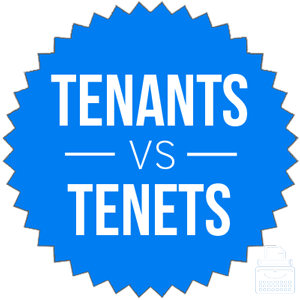In most cases, young adults spend a few years renting property before buying a home outright. This is done for any number of reasons: increased home prices, job relocation, income history, etc. Renting has some benefits to home ownership, but most people would prefer to own their own home.
In an environment of lessors and lessees, landlords and tenants, careful wording is essential. A property manager wouldn’t want to make a mistake while writing a lease any more than an occupant would want to make a mistake while reading it. It may surprise you to learn that many people confuse tenant with another common word: tenet.
The mistake is understandable. Both words function as nouns, and if they are not pronounced carefully, they sound identical when spoken out loud. But the truth is that these are two distinct words with meanings that never overlap.
What is the Difference Between Tenants and Tenets?
In this post, I will compare tenets vs. tenants. I will include several example sentences for each word to give you an idea of how it should appear in context.
I will also show you a helpful memory tool that makes choosing tenets or tenants a bit easier.
When to Use Tenants
 What does tenants mean? Tenants is a plural noun. A tenant (singular) is someone who rents property.
What does tenants mean? Tenants is a plural noun. A tenant (singular) is someone who rents property.
Tenants, therefore, refers to more than one such person. A landlord might seek new tenants when the current ones move away, for example.
Here are a few more sentences that include the word tenants,
- The tenants upstairs like to throw noisy parties, and we complain to the property manager on a weekly basis.
- Tenants must notify the landlord of intent to vacate at least 30 days prior to the expected move out date.
Tenant has been around since Middle English—even earlier if we count its roots as a conjugation of an Anglo-French verb that meant to hold.
When to Use Tenets
 What does tenets mean? Tenets is another plural noun. Tenets means foundational beliefs, especially of a religion or other doctrine.
What does tenets mean? Tenets is another plural noun. Tenets means foundational beliefs, especially of a religion or other doctrine.
One of the tenets of Christianity, for example, is that Jesus Christ died by crucifixion and rose from the dead three days later. One of the foundational beliefs of Islam is that Jesus Christ was a prophet of Allah.
Here are a few more examples of tenets in context,
- The idea that dreams reveal unconscious desires is a tenet of Freudian psychoanalysis.
- One of the tenets of Marxist literature analysis is that plot events and relationships between characters can be interpreted as the effects of imbalances in power and wealth.
Similarly to tenant, tenet is derived from an outdated foreign verb that meant to hold. For tenet, however, the root word is Latin, not French.
Trick to Remember the Difference
 Misusing tenant for tenet is a common mistake. Mixing them up the opposite way is less common but still a real possibility.
Misusing tenant for tenet is a common mistake. Mixing them up the opposite way is less common but still a real possibility.
Tenant vs. Tenet Check: To keep them straight in your mind, remember that tenant and occupant both mean someone who lives in a place, and both end in -ant.
Summary
Is it tenant or tenet? Tenets and tenants are plural nouns that are often confused with each another.
- A tenant is a person who rents property.
- A tenet means a foundational belief.
The two can never be properly substituted for each other, so be sure to remember which is which.
Contents
